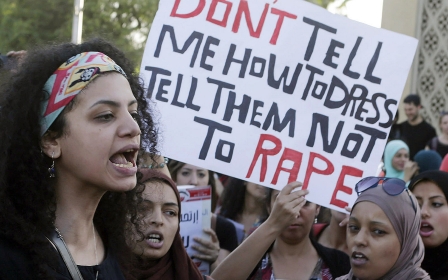Egypt: Singer Amr Diab condemned for 'predatory' car advert

Renowned Egyptian pop singer Amr Diab, 60, has come under fire after featuring in an advertisement for the car manufacturer Citroen that has been accused of normalising harassment against women.
The advert, which was released by Citroen Egypt on 3 December but has gone viral on social media for all the wrong reasons, has been viewed over 3,000,000 times.
The singer is seen cruising in his new Citroen C4 when a woman steps onto the road and appears to be almost struck by the vehicle. Diab, clearly interested in the women, proceeds to take a photo of her using a new feature of the car.
Later, the woman joins Diab, and they end up looking like a happy couple. The background music in the advert is a romantic song performed by Diab.
Online, people have questioned how the concept of the advert was approved, with many also saying that it encourages harassment in a country where the issue is already endemic.
New MEE newsletter: Jerusalem Dispatch
Sign up to get the latest insights and analysis on Israel-Palestine, alongside Turkey Unpacked and other MEE newsletters
The video, which has been shared over 500 times over the past day on Twitter, has been labelled "illegal activity" by some. Others encouraged people to refrain from buying the car because of it.
Middle East Eye has asked Citroen Egypt and Diab for comment.
Some took to social media to share their own experiences of sexual harassment. People said that they feel unsafe on Egypt's streets, and argued that the advert could exacerbate an ongoing problem.
According to a United Nations study, 99.3 percent of Egyptian girls and women surveyed experience some form of sexual harassment in their lifetime. The study also showed that 82.6 percent of the total female respondents did not feel safe or secure in the street.
Amr Diab is one of the Arab world's most popular and well-known artists. He has amassed a following of over 13.8 million on Instagram and over 30 albums.
Sexual harassment in Egypt has made headlines locally and globally since the 2011 revolution.
Despite legislation and civil society efforts to address the practice, surveys have shown that nearly 60 percent of women have been the target of this form of violence in public spaces, and an equal proportion of men have admitted to harassing women in public.
Earlier this year, the Egyptian parliament approved harsher penalties for sexual harassment and related crimes and upgraded them to felony offences.
Middle East Eye delivers independent and unrivalled coverage and analysis of the Middle East, North Africa and beyond. To learn more about republishing this content and the associated fees, please fill out this form. More about MEE can be found here.




